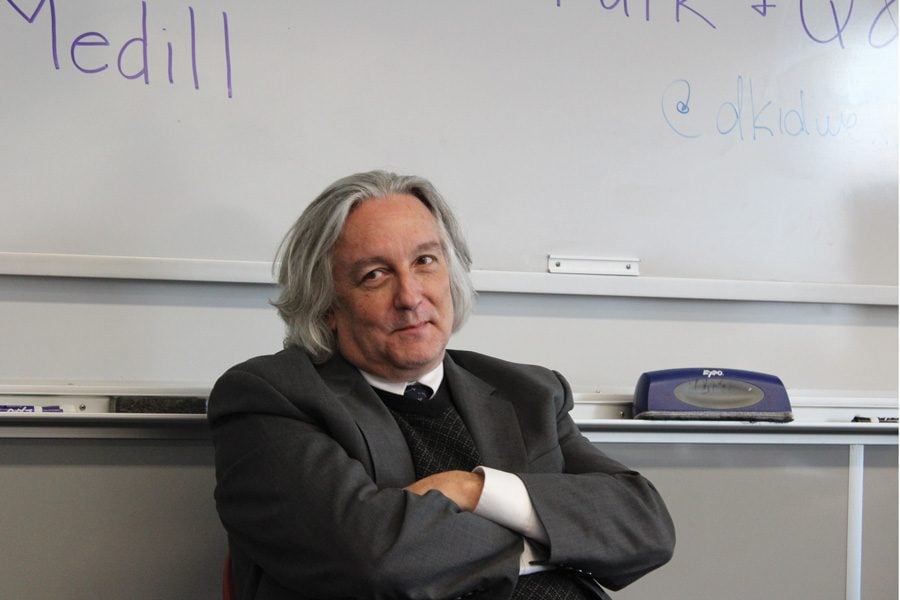David Kidwell talks Illinois corruption and press transparency at SPJ event
Zoe Malin / The Daily Northwestern
Investigative journalist David Kidwell spoke to students in the McCormick Foundation Center at an event sponsored by NU’s chapter of the Society of Professional Journalists.
May 16, 2019
On Wednesday, reporter David Kidwell, whose investigative pieces led to the arrest of former Illinois Governor Rod Blagojevich and revealed a $2 million Chicago bribery scandal, spoke about corruption in Illinois and his effort to keep government officials transparent to students at an event hosted by Northwestern’s chapter of the Society of Professional Journalists.
Kidwell began his 35-year career at the Iroquois County’s Times-Republic, working almost every position available at the publication, and went on to spend the majority of his time as a reporter at the Miami Herald and later at the Chicago Tribune. Currently, Kidwell works as the special projects editor at the Better Government Association, a nonprofit government watchdog organization.
During the event, Kidwell stressed the importance of persistence with investigative reporting. While working as a beat reporter, he said, he would “always have something long-term going” in case he was given the chance to write an in-depth piece.
“The only difference between an investigative reporter and a real reporter is time,” Kidwell said, “I have the luxury of time. I don’t have any extra skills. I don’t have any extra talent. If you produce enough and you do well enough on beats and covering general assignments, and you hone those skills, if you want to take six months of story that’s when you’re more likely going to be able to do it. That’s when they’re going to give you the time to do it. ”
One of his earliest successes in deeper investigative pieces was an article he wrote at The Tampa Tribune, where he exposed a scandal in the sheriff’s department in which they spent “$30,000 in taxpayer funded lap dances,” under the guise of an “undercover investigation.”
The success of his Tampa Tribune article landed him a spot on the Miami Herald’s staff, where he would continue to pursue investigative pieces. In one instance, Kidwell refused to testify about an interview he had with a murder defendant, leading to his arrest and two weeks spent in jail.
In 2005, Kidwell began writing for the Chicago Tribune, where he was almost immediately given the assignment to find any information on then-governor Blagojevich. His investigation revealed that Patricia Blagojevich, the governor’s wife, ran a real estate listing that was “a conduit for bribes” for her husband. Kidwell’s story would be one of the many used as the basis of a federal investigation into the governor that allowed for a wiretap, which eventually exposed Blagojevich’s attempt at selling Barack Obama’s vacated Senate seat and led to the governor’s arrest.
Six years after Kidwell’s investigation into the governor, he was involved with another investigation into the city of Chicago’s contract with a red-light camera company, which revealed a $2 million bribery scandal that led to the arrests of six people.
Medill Prof. Ceci Rodgers, the faculty advisor for SPJ, “really appreciated” Kidwell’s advice to start one’s journalism career at a smaller publication first where the risk level is lower. One point he stressed was the significance of transparency and the Freedom of Information Act, especially with the ushering in of new Chicago mayor Lori Lightfoot, Rodgers said.
“What he had to say about really urging the state of Illinois and the city of Chicago to do away with the current restrictions on FOIA, would do a whole lot more to root out corruption than almost anything else,” Rodgers said.
Those restrictions, Kidwell said, allow the city to permanently exempt any piece of information that was made or said before a vote from being released to the public.
He advised journalism students to not jump at the opportunity to join a large news organization, but to instead be the “bigger fish in a smaller pond” and learn your craft at a small, local publication.
Co-president of SPJ Bryana Quintana, said Kidwell’s visit to NU was important because “journalism isn’t just for journalists,” and even non-journalists consume news wherever they go. Quintana said Kidwell’s sacrifices as a journalist, especially his time behind bars, was a clear example of journalism’s goal to bring justice.
“It just really shows how he’s really dedicated to his craft and he’s really dedicated to trying to bring about the truth,” the Medill sophomore said.
Despite reporting on those in power, Kidwell never felt “seriously threatened,” he said. The closest he came to being intimidated was after he exposed a fake I.D. ring during his stint in Miami. Federal investigators called him to inform him that after they raided the I.D. ringleader’s home, they found a post-it note on his computer that said, “Kill David Kidwell.”
The pressure of investigation never preoccupied Kidwell too much, he said. He never dwelled on larger partisan effects because only a few weeks later he would have to begin another six-month investigation.
“What I do is I listen to these people and when they lie to me, I write about it. That’s all. That’s all I can do,” Kidwell said.
Twitter: @awstinbenavides
Email: austinbenavides2022@u.northwestern.edu
Related Stories:
– Blagojevich guilty on 17 of 20 corruption charges


